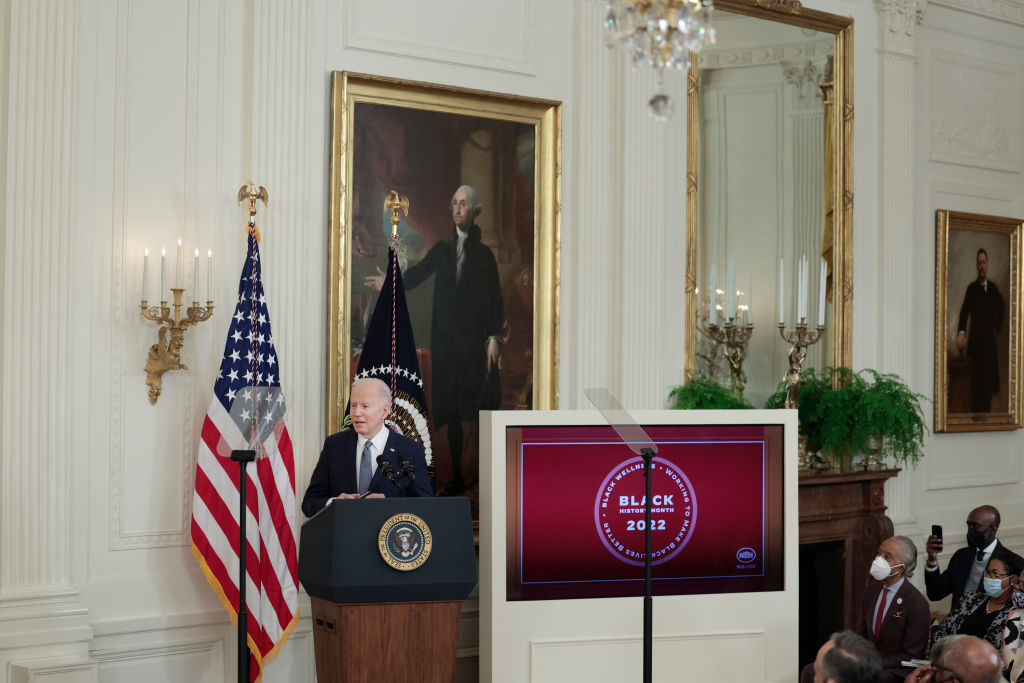Will Biden's State of the Union speech boost his approval ratings? History says probably not.


A free daily email with the biggest news stories of the day – and the best features from TheWeek.com
You are now subscribed
Your newsletter sign-up was successful
As President Biden prepares to deliver his first State of the Union address on Tuesday night, his approval rating sits at 44 percent, CBS News reports.
According to Gallup, Biden took office with an approval rating of 57 percent but dropped below 50 during the chaotic withdrawal from Afghanistan in August. His poll numbers continued to fall as the worst inflation in 40 years took a toll on Americans' wallets, bottoming out at 40 percent in early-to-mid January.
White House Press Secretary Jen Psaki said Monday that, in his speech, Biden plans to address inflation, "talk about steps to lower consumer prices," and tout the strong labor market recovery he's overseen.
The Week
Escape your echo chamber. Get the facts behind the news, plus analysis from multiple perspectives.

Sign up for The Week's Free Newsletters
From our morning news briefing to a weekly Good News Newsletter, get the best of The Week delivered directly to your inbox.
From our morning news briefing to a weekly Good News Newsletter, get the best of The Week delivered directly to your inbox.
Unfortunately for Biden, if history is any indicator, none of that will do much to boost his approval rating.
When former President Donald Trump delivered his first SOTU on Jan. 30, 2018, his approval rating stood at 38 percent. It then briefly climbed to 40 before dropping to 37 by mid-February, Gallup polling shows.
Gallup recorded a small bump — from 48 to 50 percent — in President Barack Obama's approval rating in the days after his first State of the Union.
President George W. Bush's approval rating actually went down after his first address on Jan. 29, 2002, but to be fair, it couldn't have gotten much higher. With the 9/11 attacks still fresh in their minds, 84 percent of Americans said they approved of Bush's job performance before he gave the speech compared to 82 percent after.
A free daily email with the biggest news stories of the day – and the best features from TheWeek.com
President Bill Clinton saw his poll numbers jump from 54 to 58 percent after his first SOTU, but within a month he was back down to 53.
Grayson Quay was the weekend editor at TheWeek.com. His writing has also been published in National Review, the Pittsburgh Post-Gazette, Modern Age, The American Conservative, The Spectator World, and other outlets. Grayson earned his M.A. from Georgetown University in 2019.
-
 Properties of the week: pretty thatched cottages
Properties of the week: pretty thatched cottagesThe Week Recommends Featuring homes in West Sussex, Dorset and Suffolk
-
 The week’s best photos
The week’s best photosIn Pictures An explosive meal, a carnival of joy, and more
-
 The ‘ravenous’ demand for Cornish minerals
The ‘ravenous’ demand for Cornish mineralsUnder the Radar Growing need for critical minerals to power tech has intensified ‘appetite’ for lithium, which could be a ‘huge boon’ for local economy
-
 NIH director Bhattacharya tapped as acting CDC head
NIH director Bhattacharya tapped as acting CDC headSpeed Read Jay Bhattacharya, a critic of the CDC’s Covid-19 response, will now lead the Centers for Disease Control and Prevention
-
 Witkoff and Kushner tackle Ukraine, Iran in Geneva
Witkoff and Kushner tackle Ukraine, Iran in GenevaSpeed Read Steve Witkoff and Jared Kushner held negotiations aimed at securing a nuclear deal with Iran and an end to Russia’s war in Ukraine
-
 Pentagon spokesperson forced out as DHS’s resigns
Pentagon spokesperson forced out as DHS’s resignsSpeed Read Senior military adviser Col. David Butler was fired by Pete Hegseth and Homeland Security spokesperson Tricia McLaughlin is resigning
-
 Judge orders Washington slavery exhibit restored
Judge orders Washington slavery exhibit restoredSpeed Read The Trump administration took down displays about slavery at the President’s House Site in Philadelphia
-
 Hyatt chair joins growing list of Epstein files losers
Hyatt chair joins growing list of Epstein files losersSpeed Read Thomas Pritzker stepped down as executive chair of the Hyatt Hotels Corporation over his ties with Jeffrey Epstein and Ghislaine Maxwell
-
 Judge blocks Hegseth from punishing Kelly over video
Judge blocks Hegseth from punishing Kelly over videoSpeed Read Defense Secretary Pete Hegseth pushed for the senator to be demoted over a video in which he reminds military officials they should refuse illegal orders
-
 Trump’s EPA kills legal basis for federal climate policy
Trump’s EPA kills legal basis for federal climate policySpeed Read The government’s authority to regulate several planet-warming pollutants has been repealed
-
 House votes to end Trump’s Canada tariffs
House votes to end Trump’s Canada tariffsSpeed Read Six Republicans joined with Democrats to repeal the president’s tariffs
